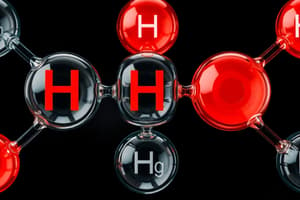Podcast
Questions and Answers
Organic compounds are generally soluble in water.
Organic compounds are generally soluble in water.
False (B)
The lower layer in a mixture of organic compounds and water is composed of organic materials.
The lower layer in a mixture of organic compounds and water is composed of organic materials.
False (B)
In a water and organic compound mixture, the upper layer is less dense than the lower layer.
In a water and organic compound mixture, the upper layer is less dense than the lower layer.
True (A)
When organic compounds and water are mixed, they create a single homogeneous layer.
When organic compounds and water are mixed, they create a single homogeneous layer.
Water is the less dense liquid when compared to organic materials.
Water is the less dense liquid when compared to organic materials.
Flashcards
Solubility of Organic Compounds in Water
Solubility of Organic Compounds in Water
Organic compounds, like oil or fats, do not mix with water.
Insoluble
Insoluble
A substance that does not dissolve in another substance.
Upper Layer
Upper Layer
The layer on top of a mixture of two liquids, usually less dense.
Lower Layer
Lower Layer
Signup and view all the flashcards
Density
Density
Signup and view all the flashcards
Study Notes
Hydrocarbons
- Hydrocarbons are primarily composed of carbon and hydrogen
- Alkanes have only single bonds
- Alkenes have one or more carbon-carbon double bonds
- Alkynes have one or more carbon-carbon triple bonds
- Aromatic hydrocarbons have a circular pattern of double and single bonds
Saturated vs. Unsaturated
- Saturated hydrocarbons have no double or triple bonds (alkanes)
- Unsaturated hydrocarbons contain double or triple bonds (alkenes, alkynes, and aromatics)
Physical Properties of Hydrocarbons
- Volatility: Hydrocarbons are nonpolar due to similar electronegativities of carbon and hydrogen. They have low intermolecular forces, thus requiring less energy to vaporize compared to polar compounds. Small hydrocarbons are more volatile than large ones.
- Odor: The volatility of hydrocarbons causes them to vaporize and travel through the air, allowing us to smell them. Many hydrocarbons have characteristic odors.
- Solubility: Hydrocarbons are nonpolar, meaning they have minimal attraction to polar compounds like water. This results in limited solubility in water. They are more soluble in other nonpolar solvents.
- Density: Nonpolar hydrocarbons have weak intermolecular forces, leading to a low density. This is in contrast to polar compounds that have stronger intermolecular forces and higher densities.
Solubility Test
- Hydrocarbons are generally insoluble in water.
- The test demonstrates that hydrocarbons and water form separate layers in a solution based on their different densities and polarities. Water is denser than the hydrocarbon.
Studying That Suits You
Use AI to generate personalized quizzes and flashcards to suit your learning preferences.




